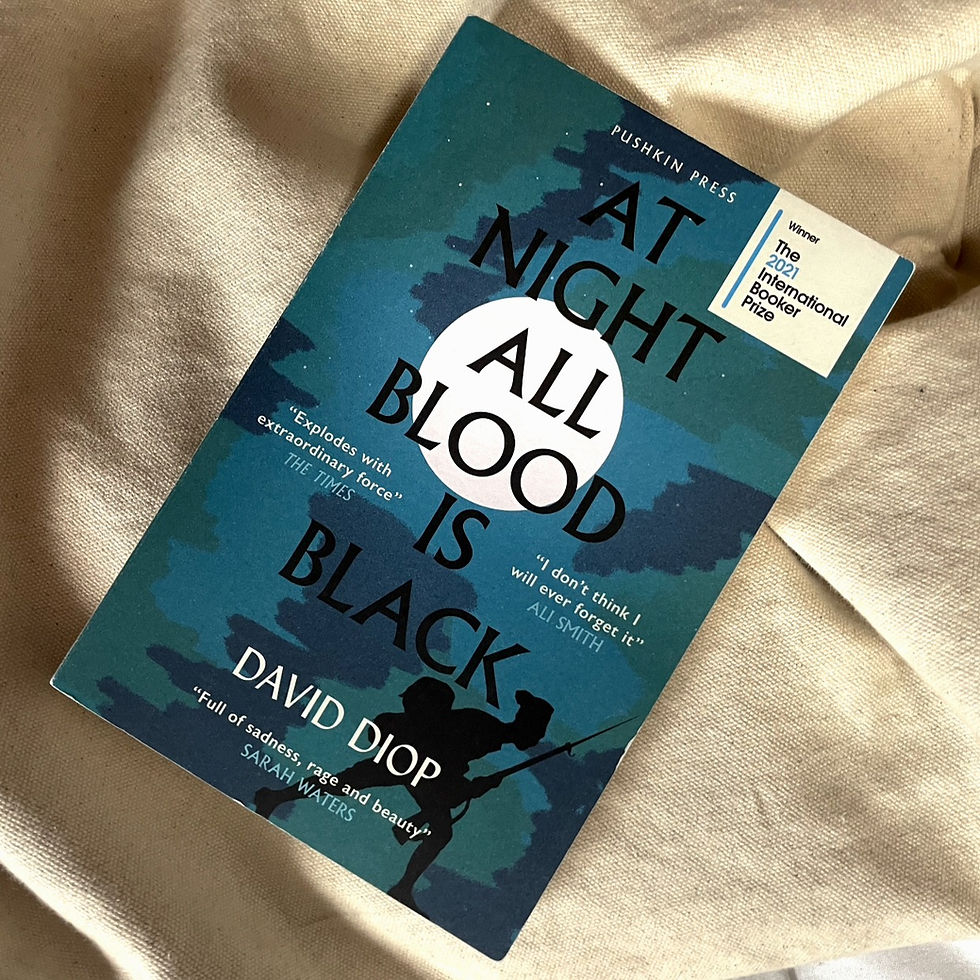Book Review: At Night All Blood Is Black
- Jielin Eeo
- Apr 4, 2022
- 6 min read
Welcome to the first of hopefully many book reviews! I said this in my last post, but I've been on a roll and this was the most recent book that I've finished. I've bought four paperback books since I've been in London, which is extremely stupid of me given the fact that I barely was able to fit everything into my luggage when I first came here. I don't know if I have any room to bring any of these books back, but that is a ~consequence that I will deal with later~ ❤️

Anyways, this week's book is a short one called At Night All Blood Is Black by David Diop. The tea is that I actually was 90% done with Klara and the Sun before I started this one, but I took a weekend trip to Spain to visit my friends in Madrid/Valencia and wanted to pack light. So, I opted to leave Klara and the Sun at home and brought a little tote bag — this is when I realized that I had no source of entertainment for my LONG travel day + flight, especially since RyanAir seats don't have outlets (damn you RyanAir)! I went into a Waterstones at the Liverpool train station and asked the cashier if she had any recommendations for short books that I could fit into my tote. She recommended this one and prefaced that it's pretty heavy, dealing with themes like war, mental collapse, race, and masculinity. It's also won the 2021 International Booker Prize, which is pretty cool. It was definitely a dark read, but one that I mostly enjoyed.
TW: Mentions of sexual assault and violence
Synopsis
At Night All Blood Is Black is a disturbing book — there's no doubt about that. The story centers around and is told from the perspective of Alfa Ndiaye, a Senegalese soldier fighting alongside the French in World War 1. Alfa's story is told out of chronological order, creating a disorienting and fragmented feeling that adds to the overall theme of mental collapse or madness.
The sheer violence and panic that comes from war is exacerbated once Alfa's "more-than-brother" Mandemba Diop is killed in combat. In a brutal scene description, Alfa describes Mademba's death, explaining how a German soldier ambushes him, slashes Mademba’s stomach with a bayonet, and disembowels him on the battlefield. Alfa cannot bring himself to execute mercy killing on his friend, and Mandemba slowly fades to death after begging three separate times for Alfa to slit his throat.
Following this, Alfa begins to partake in a particularly macabre and gruesome ritual of sneaking up to enemy lines, disemboweling an enemy soldier, and slicing off their hand with his machete. He brings these hands back to his camp, where his fellow soldiers laugh. I imagine it's sort of like: "Damn! This mf is crazy — look at him, bringing back hands for us. What a guy." His friends toss the hands around, playing with them and even taping them to their guns/helmets to mock the enemy lines. However, after the third hand or so, the practice of bringing back a hand after battle is no longer entertaining — it's off-putting. Rumors circulate that Alfa is a sorcerer, a dëmm, and that he brings bad luck. By the seventh hand, the captain sends him to rest in the military hospital, as everyone now believes he has gone crazy.
Alfa spends the next few chapters in this hospital setting, recounting stories about his mother, father, acquaintances, Mademba, and his village girlfriend Fary. The flashbacks are colorful and exciting, but they are contrasted with the bleak scenes of Alfa's hospital reality. This is where Afla's mental deterioration really starts to pick up, and the rest of the book is filled with strange abstract descriptions and a few unpleasant scenes. The ending is ambiguous and implies that Alfa believes that Mademba has been reincarnated into his body, showing how his guilt has been pushed to the extreme.
Analysis and Reflection
The first vibe I got from this book was frantic and uneasy: in the first chapter, the author gives a short overview of Mandemba's death and the beginning of Alfa's madness:
"But instead of coming through for you, I let you die condemning me, bawling, drooling, screaming, shitting yourself like a feral child... Maybe to save my own soul, maybe to remain the person those who raised me hoped for me to be...But before you, Mademba, I was incapable of being a man." (p. 6-7)
This narration style, which I guess resembles a sort of stream of consciousness, is used throughout the book and is a clear indication of Alfa's mental breakdown and ultimate doom. Later on in the story, Alfa clearly has descended into madness and fails to self-identify:
"They ask me my name, but I'm waiting for them to reveal it to me. I swear to you that I no longer know who I am. I can only tell them what I feel...I swear to you that I get the sense nothing can resist me, that I am immortal, that I could pulverize boulders just by squeezing them into my arms." (p. 135)
Again, it's super disturbing to read. Excerpts like this, especially towards the end of the novel, show the gradual move into insanity — obviously, it seems to be an effect of PTSD from the war as well. I found Alfa's character to be heart-wrenching, but at the same time, the narration felt claustrophobic and eerie. Clearly, by the end of the book, he's no longer the strong and confident man that he was before the war. I needed to take a break while reading the second half because some of the content was so uncomfortable.
Something that I'm conscious of and grateful for with At Night All Blood Is Black is the fact that the piece is told from the perspective of a minority character. I think it's very easy to forget that millions of imperialized/colonized soldiers were dragged into fighting, acting as physical proxies or chess pieces for their white counterparts. The presence of race and racial stereotypes is interesting too. There's a part of the book that talks about how the French capitalize on the stereotypes of black savagery and animalistic behaviors to scare the opposing German forces. Alfa notes this as well:
"Looking into the enemy's blue eyes, I often see a panicked fear of death, of savagery, of rape, of cannibalism. I see in his eyes what he's been told about me, and what he's believed without ever seeing me." (p. 19)
In a more general observation, the book also highlights the general loss of identity and humanity when it comes to war. What starts as a conflict between alliances of European powers trickles down to real people (people like Alfa), whose rich and intricate backgrounds are blatantly ignored and slowly cease to exist at all. I'm particularly disturbed by the story given the atrocities that are happening in Ukraine — something that is supposed to be clearly traumatizing and unacceptable still happens today, and hearing the sheer insanity that Ndiaye falls into while fighting is not exactly a reassuring indication of our present and future. Staying on the topic of war, there were a lot of chilling comparisons to life in the face of war:
"Seen from a distance, our trench looked to me like the slightly parted lips of an immense woman's sex. A woman, open, offering herself to war, to the bombshells, and to us, the soldiers." (p. 9)
Clearly, sex is not the first thing I would really consider when talking about wide-scale massacres and war, so I thought it was interesting that David Diop decided to use that description for a trench. Leaving the womb usually is a sign of birth and life — however, leaving the trench in At Night All Blood Is Black almost always results in death.
The ending of At Night All Blood Is Black bothered me, initially because I had no idea what was going on. Alfa's narration was coherent, albeit unsettling, for most of the story. Yet, you get to the end and read passages like this:
"I am the shadow that devours rock, mountains, forests, and rivers, the flesh of beasts and of men. I slice skin, smash bones, and I suck out their marrow." (pg. 137)
"I swear to you, God's truth, that the little voice entering my head from very, very far away helped me to guess. The little voice knew that my body couldn't reveal everything about me to me." (p. 138)
I literally had no idea what was happening at this point until I read a theory online that the guilt from Alfa seeing Matemba die ultimately drives Alfa to believe that he is Matemba reincarnated. Then, it started making sense — prior chapters feel out-of-body and like Alfa is dissociating, especially when he says he doesn't know who he is or where he is. There's also a scene where Alfa sneaks into a room and rapes a hospital nurse, which in hindsight is Alfa embodying Matemba in that moment because Matemba died a virgin and Alfa seemingly wanted to give Matemba the pleasure of having sex. Overall, very scary stuff.
Closing Thoughts
While the book is tough to read in certain portions, I would definitely recommend At Night All Blood Is Black. World War 1 isn't something that I would ever go out of my way to read about, but I'm glad the Waterstones employee recommended it to me! In my opinion, it's an extremely relevant book for today and tells a heartbreaking story while keeping you on your toes. I find myself thinking a lot about At Night All Blood Is Black, even though its been a few days since reading it.



Comments